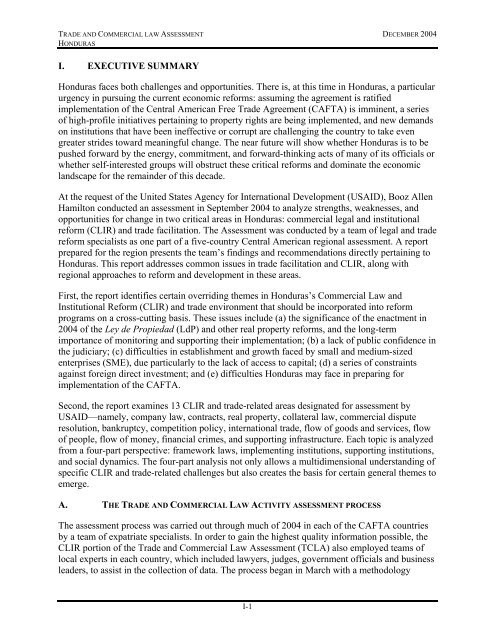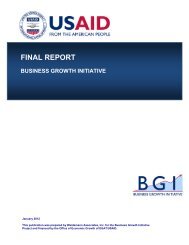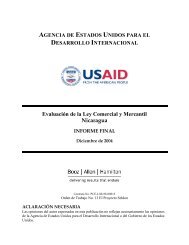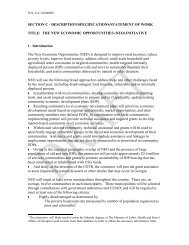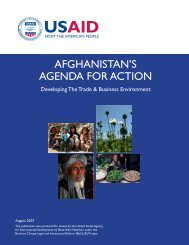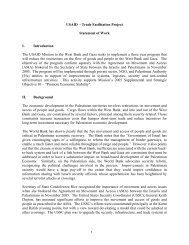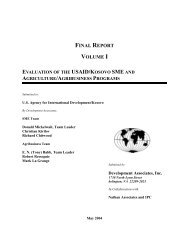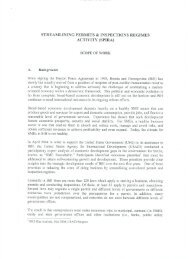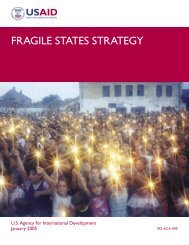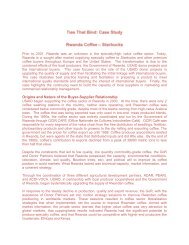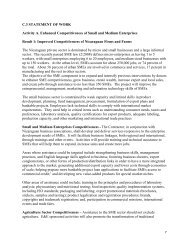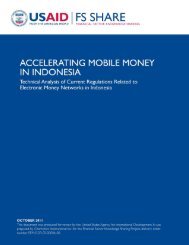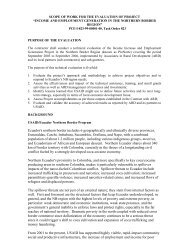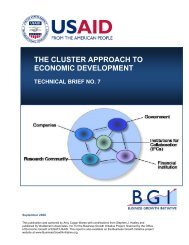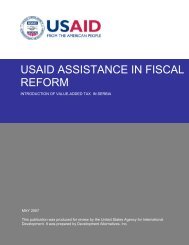Trade and Commercial Law Assessment - Honduras - Economic ...
Trade and Commercial Law Assessment - Honduras - Economic ...
Trade and Commercial Law Assessment - Honduras - Economic ...
Create successful ePaper yourself
Turn your PDF publications into a flip-book with our unique Google optimized e-Paper software.
TRADE AND COMMERCIAL LAW ASSESSMENT DECEMBER 2004HONDURASI. EXECUTIVE SUMMARY<strong>Honduras</strong> faces both challenges <strong>and</strong> opportunities. There is, at this time in <strong>Honduras</strong>, a particularurgency in pursuing the current economic reforms: assuming the agreement is ratifiedimplementation of the Central American Free <strong>Trade</strong> Agreement (CAFTA) is imminent, a seriesof high-profile initiatives pertaining to property rights are being implemented, <strong>and</strong> new dem<strong>and</strong>son institutions that have been ineffective or corrupt are challenging the country to take evengreater strides toward meaningful change. The near future will show whether <strong>Honduras</strong> is to bepushed forward by the energy, commitment, <strong>and</strong> forward-thinking acts of many of its officials orwhether self-interested groups will obstruct these critical reforms <strong>and</strong> dominate the economicl<strong>and</strong>scape for the remainder of this decade.At the request of the United States Agency for International Development (USAID), Booz AllenHamilton conducted an assessment in September 2004 to analyze strengths, weaknesses, <strong>and</strong>opportunities for change in two critical areas in <strong>Honduras</strong>: commercial legal <strong>and</strong> institutionalreform (CLIR) <strong>and</strong> trade facilitation. The <strong>Assessment</strong> was conducted by a team of legal <strong>and</strong> tradereform specialists as one part of a five-country Central American regional assessment. A reportprepared for the region presents the team’s findings <strong>and</strong> recommendations directly pertaining to<strong>Honduras</strong>. This report addresses common issues in trade facilitation <strong>and</strong> CLIR, along withregional approaches to reform <strong>and</strong> development in these areas.First, the report identifies certain overriding themes in <strong>Honduras</strong>’s <strong>Commercial</strong> <strong>Law</strong> <strong>and</strong>Institutional Reform (CLIR) <strong>and</strong> trade environment that should be incorporated into reformprograms on a cross-cutting basis. These issues include (a) the significance of the enactment in2004 of the Ley de Propiedad (LdP) <strong>and</strong> other real property reforms, <strong>and</strong> the long-termimportance of monitoring <strong>and</strong> supporting their implementation; (b) a lack of public confidence inthe judiciary; (c) difficulties in establishment <strong>and</strong> growth faced by small <strong>and</strong> medium-sizedenterprises (SME), due particularly to the lack of access to capital; (d) a series of constraintsagainst foreign direct investment; <strong>and</strong> (e) difficulties <strong>Honduras</strong> may face in preparing forimplementation of the CAFTA.Second, the report examines 13 CLIR <strong>and</strong> trade-related areas designated for assessment byUSAID—namely, company law, contracts, real property, collateral law, commercial disputeresolution, bankruptcy, competition policy, international trade, flow of goods <strong>and</strong> services, flowof people, flow of money, financial crimes, <strong>and</strong> supporting infrastructure. Each topic is analyzedfrom a four-part perspective: framework laws, implementing institutions, supporting institutions,<strong>and</strong> social dynamics. The four-part analysis not only allows a multidimensional underst<strong>and</strong>ing ofspecific CLIR <strong>and</strong> trade-related challenges but also creates the basis for certain general themes toemerge.A. THE TRADE AND COMMERCIAL LAW ACTIVITY ASSESSMENT PROCESSThe assessment process was carried out through much of 2004 in each of the CAFTA countriesby a team of expatriate specialists. In order to gain the highest quality information possible, theCLIR portion of the <strong>Trade</strong> <strong>and</strong> <strong>Commercial</strong> <strong>Law</strong> <strong>Assessment</strong> (TCLA) also employed teams oflocal experts in each country, which included lawyers, judges, government officials <strong>and</strong> businessleaders, to assist in the collection of data. The process began in March with a methodologyI-1


